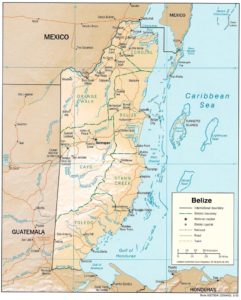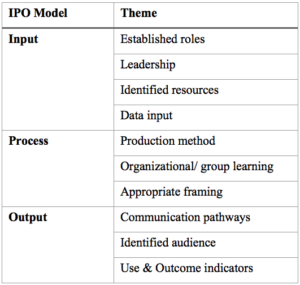Many issues continue to cause severe changes to ocean environments and may be classified as “wicked” problems. At the same time, extensive scientific information exists that has the potential to inform management and policy in addressing the issues. However, a challenge persists in translating this information into usable forms for decision makers to make informed and appropriate decisions. Many governmental organizations have used a working group approach to involve various stake holders in developing recommendations for decision-making. Working groups are commonly used to address problems that require interdisciplinary skills and knowledge. A working group can be described as a number of representatives from different organizations with a common interest in addressing shared objectives. A notable example of this approach is the working groups operating within the Intergovernmental Panel on Climate Change to assess the physical (Working Group 1), socio-economic (Working Group II), and mitigation measures (Working Group III) of climate change.
This research project focused on gaining an understanding of working groups central to the Belize Fisheries Department and the sustainable management of fisheries resources in Belize. The processes by which the groups develop information and recommendations are not readily evaluated. Therefore, this study was designed to determine the role of three technical working groups in the policy and decision-making process related to conservation and fisheries management with the view to establishing criteria for assessing such groups.
 In this study, the composition, the information production and communication processes, and the uptake of information produced by each working group into decision and policy-making at the Belize Fisheries Department were examined. The groups were identified and chosen according to their membership composition, mandates, and their longevity. Seventeen open ended interviews with members of each working group as well as policy makers within the Belize Fisheries Department were conducted. Using an inductive approach, the interviews were recorded, transcribed, read in detail, and coded manually aided by the qualitative research software, NVivo 11. Broad themes emerged from the data that describe information production, communication, and use.
In this study, the composition, the information production and communication processes, and the uptake of information produced by each working group into decision and policy-making at the Belize Fisheries Department were examined. The groups were identified and chosen according to their membership composition, mandates, and their longevity. Seventeen open ended interviews with members of each working group as well as policy makers within the Belize Fisheries Department were conducted. Using an inductive approach, the interviews were recorded, transcribed, read in detail, and coded manually aided by the qualitative research software, NVivo 11. Broad themes emerged from the data that describe information production, communication, and use.
The Three Working Groups
The National Hicatee Conservation and Monitoring Network was created to address the significant decrease in the population of the Central American river turtle (Dermatemys mawii) – the hicatee. The hicatee is used by local communities as a food source and is listed as critically endangered by the International Union for Conservation of Nature (IUCN). The network was formed to study the hicatee population and develop recommendations for conservation and management. Current laws do not fully protect the hicatee and it is still hunted (Fisheries Regulations, 2003).
The Belize National Spawning Aggregation Working Group was formed to address the significant decline in the abundance of Nassau Grouper (Epinephelus striatus) due to heavy fishing. Spawning aggregation sites once supported a vibrant fishery in the early 1940s; however, both resource users and managers have since observed significant declines in production and recognized the need for focused management. Protection for 13 of the 16 spawning aggregation sites was achieved in 2002. The working group was created for the continued monitoring and conservation of spawning sites. The objectives of this group evolved to incorporate stakeholder involvement; data collection, storage, and dissemination; and to provide information and build support for management and protection of these sites (Cho-Ricketts 2015).
The Managed Access Working Group was formed to design and oversee the implementation of a national territorial use rights in fisheries (TURF) strategy in Belize. Over time the steady increase of fishing pressure has been recognized by fisheries authorities, co-managers, NGOs, and stakeholders. The strategy of TURFs was accepted as an approach to address compounding problems in fisheries management such as limited data availability and illegal, unreported, and unregulated fishing. Managed access is a form of territorial use rights in fisheries that aims to secure livelihoods of traditional users. This working group of managers is the primary coordinating body for implementing managed access in Belize.
Results and Discussion
The interview responses confirmed that the composition of the three working groups are similar. Each group consists of representatives of governmental organizations, academia, non-governmental organizations, including other stakeholders; however, most members come from research and governmental organizations. Each group schedules meetings, however, the frequency and organization of meetings vary across the groups. Each group produces five types of information: administrative, informal, scientific, public, and policy recommendations. Each type is intended for different audiences and is produced through individual or co-production efforts.
Individual production: Organizations collect data (input), produce findings (in-house production), then they share the information with the working groups (information sharing) for synthesis or further use.
Co-production: Organizations from different sectors (NGOs, academia, and government) collect data (input), share data with the working groups, which then produce findings for further use.
Analysis of the interviews revealed enablers and barriers to information production and communication pathways. The main barriers included limited resources, infrequent meeting times, and membership unavailability. In contrast, the main enablers included the commitment of members and collaboration.
Working Groups as Knowledge Brokers
By investigating the operational processes of these groups, I determined that their activities can best be described as knowledge brokerage. Knowledge brokerage refers to the act of facilitating the uptake of information into policy making to inform and address complex issues. Knowledge brokerage encourages policy makers to use recommendations generated from research and conversely incentivizes scientists to produce relevant research for use in decision making.
These strategies were used by each working group. The coding identified the context in which the strategies were employed and how they could be improved, or the groups could become more effective in information production and communication.
Criteria to Evaluate Working Group Effectiveness
Using the identified barriers and enablers in the working group approach, criteria were developed to provide a standardized format for the formation and evaluation of the effectiveness of these groups. Though only marine working groups were studied, the criteria are not limited to marine groups. With the Input-Process-Output (IPO) model, the groups can evaluate and identify communication gaps in the science-policy interface in fisheries management in Belize. Applying the criteria may also be beneficial in assessing the top three barriers and enablers (based on frequency of mention) related to resource availability, membership commitment, and organization of meetings.
Table 1. Main themes for assessing working group effectiveness
The input criteria outline substantial organizational aspects needed for a working group to function. Questions posed to members of the working groups included:Are leadership roles defined in the working group? Are suitable resources available for working group operations? Are the collected data considered to be consistent and credible? Working groups can plan and identify actors involved, their roles, data to be collected, and resources needed to address the issue.
The process criteria allow working groups to identify best practices for data collection, evaluation, information production, and framing of results to achieve desired management outcomes. Questions relating to the method(s) used in producing information, self evaluation, and the framing of scientific information for uptake into policy making are presented where the criteria can assist members in improving these strategies to produce legitimate, credible, and relevant information. These themes were ascertained to be important as they can increase or continue the momentum of group activities. For example, the framing of scientific information is an important characteristic in the science-policy interface and influences information use in evidence-based decision-making (MacDonald et al., 2016).
Output criteria can be challenging to assess as influence of information may not be immediately measurable. Influence of information on an audience may take time before it occurs. Selecting measurable outcomes to determine the effectiveness of the working groups regarding the use or influence of its output may be the most challenging aspect in studying characteristics of the science-policy interface. Appropriate indicators of influence include biological (such as species abundance), social (number of fisheries arrests), or political (legal instruments or regulations passed) factors.
The importance of using a working group approach does not go unrecognized as many benefits in informing policy and decision making may result from this approach. The knowledge broker role shows that working groups can bring multiple actors together to effectively produce information for decision making. By identifying the roles of working groups, it can be demonstrated that they can be used for tackling complex issues outside ocean and fisheries management contexts. The criteria developed in investigating the processes of information production and communication can overcome or mitigate barriers to information production by strengthening enablers and thus making a working group more effective.
Further details about this Master of Marine Management research project are available at this link.
References
Cho-Ricketts, L. (2015). Belize National Spawning Aggregation Working Group. Retrieved from http://www.spagbelize.org/
Laws of Belize. (2003). Chapter 210: Fisheries Regulations Revised Edition.
MacDonald, B. H., Soomai, S. S., De Santo, E. M., & Wells, P. G. (Eds.). (2016). Science, information, and policy interface for effective coastal and ocean management. Boca Raton, Florida: CRC Press, Taylor & Francis Group.
Acknowledgements
I am grateful to the Belize Fisheries Department and the members of the working groups who participated in the study. I also wish to acknowledge the participants’ continuing interest and commitment to sustainable use and development of fisheries resources in Belize.
Author: Kalene Eck

